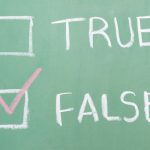 Fake news has been one of the biggest topics of the last couple of years, and the spread of misinformation online has heralded the launch of an array of fact checking websites and services. A recent paper from the Stanford Graduate School of Education wanted to test just how good professional fact checkers are at hunting out the truth in comparison to both professional historians and Stanford students.
Fake news has been one of the biggest topics of the last couple of years, and the spread of misinformation online has heralded the launch of an array of fact checking websites and services. A recent paper from the Stanford Graduate School of Education wanted to test just how good professional fact checkers are at hunting out the truth in comparison to both professional historians and Stanford students.
Despite both groups having strong reputations for uncovering accurate information, both were trumped by the fact checkers.
“Historians sleuth for a living,” the authors confess. “Evaluating sources is absolutely essential to their professional practice. And Stanford students are our digital future. We expected them to be experts.”
Checking the facts
The analysis suggests that fact checkers deploy a unique strategy that sets them apart from the rest of us. It emerged that they tend to read laterally. This means that they scan the website they’re assessing, before opening extra browser tabs to hunt for context and perspective from various angles.
The rest of us however tend to read vertically, which means we stay within the original website when conducting our evaluation of its reliability. This renders us vulnerable to seemingly authentic looking signals, such as academic references or even nonprofit urls. Indeed, the foremost skill of successful fact checkers seems to be less their subject matter expertise as much as their skepticism.
The authors have form in this area, as a previous study pitted professional fact checkers against members of the public, so they wanted to up the ante with this study by pitting them against people skilled at research and information evaluation.
“It’s the opposite of a random sample,” they explain. “We purposely sought out people who are experts, and we assumed that all three categories would be proficient.”
The fact checkers not only out performed the other participants, but they did so by a considerable margin. What’s more, the gains were consistent regardless of the political leanings of the participants. The researchers believe that finding reliable information is a key part of modern citizenship, so the findings are of vital importance.
They believe that the fact checkers “understood the web as a maze filled with trap doors and blind alleys where things are not always what they seem.”
They hope that their findings will underline the importance of developing robust guidelines for people of all ages to use when assessing the credibility of information on the Internet. Whilst many schools and libraries offer such guidance, the checklists they provide are often poorly suited to the modern ways of searching.